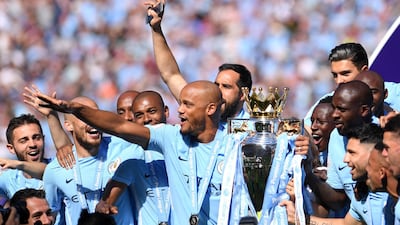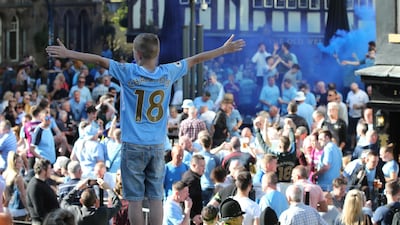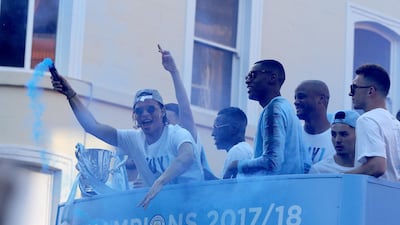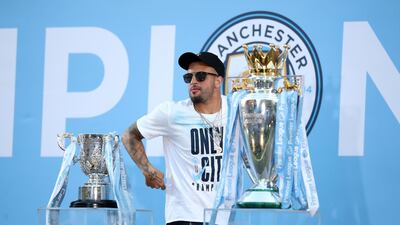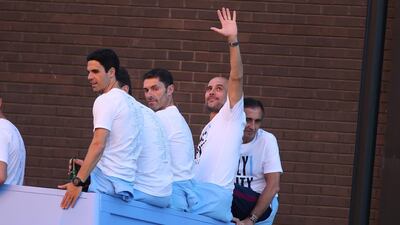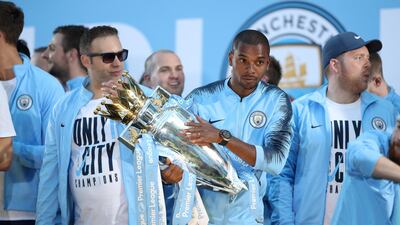Vincent Kompany remembers his arrival a decade ago. There was the training ground he repeatedly describes as “functional”, lacking doors on the toilets and the coffee machine he suggested. “Everyone was like, ‘no, in England we drink tea,’” the Manchester City captain recalls.
That did not last long. Kompany joined one club and soon found himself at another. The 10th anniversary of his signing fell last Wednesday: 10 days after his purchase, City was bought by the Abu Dhabi United Group.
“There was no information,” said the Belgian. “It was the furthest thing from my mind.” His own move was not prompted by the knowledge of what would happen in Manchester. “I was desperate to leave Hamburg,” he said. “The club was awesome, don’t get me wrong, but I had a personal issue with one of the board members. He was desperate to get me out. The first club came calling and it was Man City.”
___________
Read more:
A decade at Manchester City: 10 key moments since the Sheikh Mansour takeover
Richard Jolly: Man City need to draw on results of recent past to make 10-year anniversary a happy one
GALLERY: The 10 most important Manchester City signings under Abu Dhabi ownership
___________
He and Shaun Wright-Phillips were the final buys in former owner Thaksin Shinawatra’s reign. “We had a lot of staff members from [Shinawatra’s native] Thailand,” Kompany remembered. “They were the ones who welcomed me when I signed for the club. From one day to the other, they were all gone and Robinho was in the dressing-room. That’s when you realised things were changing.”
Those changes were not just a question of upgrading personnel. “They went from a functional training ground to a no-excuse environment where we had everything from one day to the other,” Kompany said. “Everything changed within two weeks [of an international break]. We came back and the standard was set. I don’t know who did it.” He knows, though, that both doors and a coffee machine appeared.
“We really realised it more when it was a structural change, they come in and do some work: boom, new training ground,” he explained. “Transfer window: boom, boom, boom, new players come in. It’s a healthy environment, though. It’s not a process you can stop. It just continues and continues and that’s what I enjoy.”
Robinho was the trailblazer for the superstars. “He would make us look silly because he was doing keepy-uppy with rolled-up socks,” Kompany remembered. “But at that time he fitted into the plans for building up the name of the team to attract more players.”
Some were immediate rivals for him. The departures of Pablo Zabaleta and Joe Hart mean Kompany is the last survivor of the old days. “I’ve probably competed for my spot more than any other club in the world by being at City,” he argued. “I was just speaking to Rio Ferdinand. Rio went from West Ham to Leeds, who were then playing in the Champions League, to Man United. I was able to do all that within one club. In that sense I was lucky, but it wasn’t handed on a plate. Far from it.”
The demands, he said, come from the top. Chairman Khaldoon Al Mubarak occasionally addresses the players.
“Where it stood out the most is when he wasn’t happy,” said Kompany. “And then you realise: OK, he is still a very correct and gracious man and in the way he delivers his message, but you know, it makes it hit home for everyone.
"In bad moments I always felt that he has been able to give us an extra moment from changing from being this diplomat to being the person who says the standard is there lads [points high], not here [points down] and it’s not acceptable.”
Kompany had already rationalised: “You are not guaranteed to be part of that story if you don’t perform.” He has been a constant character over a decade.
